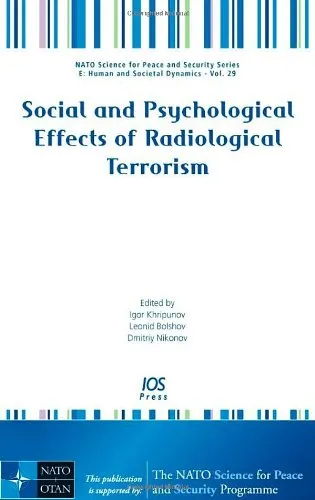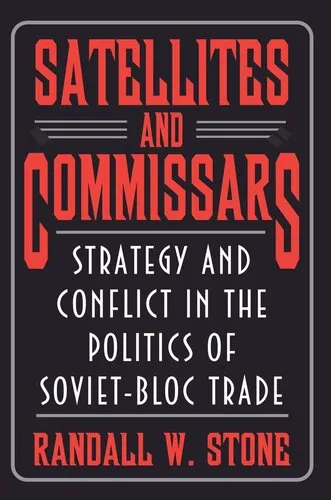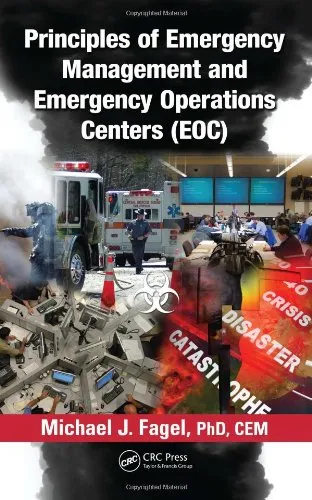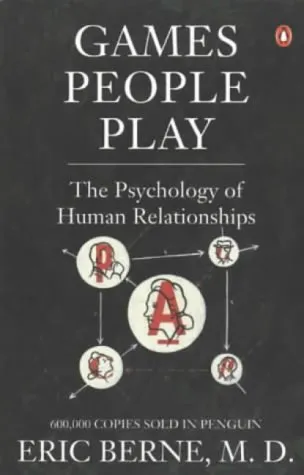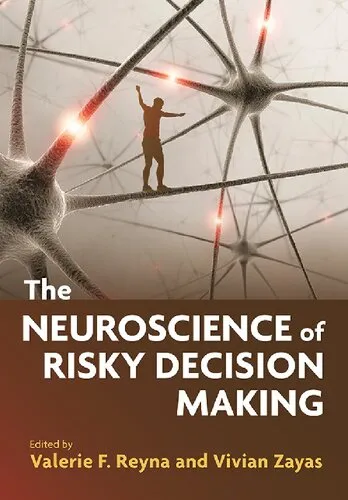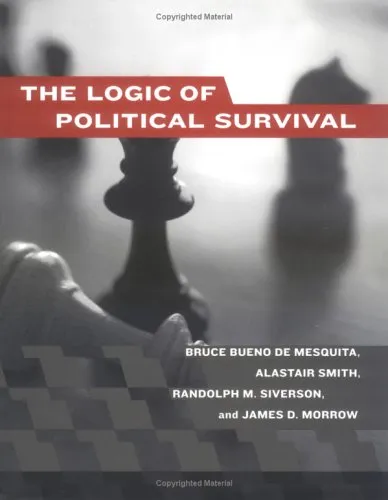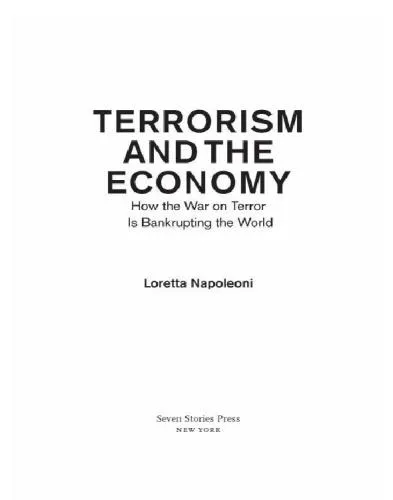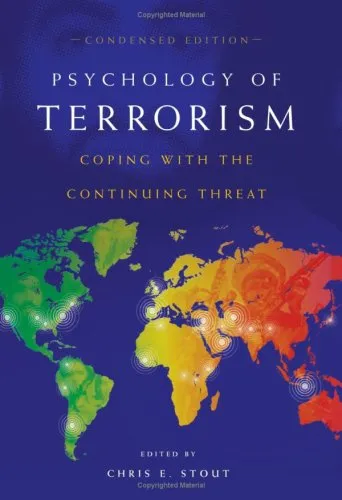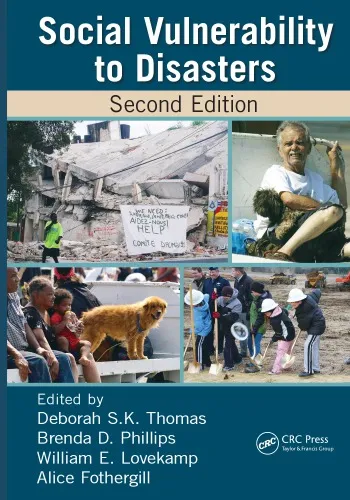Social and Psychological Effects of Radiological Terrorism: Volume 29 NATO Science for Peace and Security Series - Human and Societal Dynamics (Nato Science ... Series: Human and Societal Dynamics)
4.0
بر اساس نظر کاربران

شما میتونید سوالاتتون در باره کتاب رو از هوش مصنوعیش بعد از ورود بپرسید
هر دانلود یا پرسش از هوش مصنوعی 2 امتیاز لازم دارد، برای بدست آوردن امتیاز رایگان، به صفحه ی راهنمای امتیازات سر بزنید و یک سری کار ارزشمند انجام بدینRelated Refrences:
معرفی کتاب "Social and Psychological Effects of Radiological Terrorism"
کتاب "Social and Psychological Effects of Radiological Terrorism"، بخشی از مجموعه معتبر "NATO Science for Peace and Security Series - Human and Societal Dynamics"، یکی از منابع جامع و ضروری در حوزه بررسی ابعاد اجتماعی و روانشناختی حملات Radiological Terrorism است. این کتاب به شیوهای علمی و با بهرهگیری از تحقیقات بینالمللی، تأثیرات عمیق چنین تهدیدهایی بر جوامع انسانی را تحلیل میکند. در ادامه بخشهای مختلف این اثر توضیح داده خواهند شد.
خلاصهای از محتوای کتاب
در این کتاب، نخست به تعریف Radiological Terrorism و تفاوتهای آن با سایر انواع تهدیدهای شیمیایی و بیولوژیک پرداخته شده است. پس از آن، ابعاد گوناگون این مسئله بررسی میشود: تأثیرات مستقیم بر سلامت انسانی، آسیبهای طولانیمدت روانی و روانشناختی بر بازماندگان و جوامع درگیر، و همچنین اثرات اجتماعی نظیر افزایش احساس ناامنی و بیاعتمادی اجتماعی. نویسنده با بررسی چندین مطالعه موردی و ارائه آماری دقیق، نشان میدهد چگونه چنین تهدیداتی میتوانند به فروپاشی اعتماد عمومی بینجامند.
این کتاب همچنین به استراتژیهای مقابلهای میپردازد. از آنجایی که موضوع Radiological Terrorism بسیار پیچیده است، رویکردهای مدیریت بحران، اطلاعرسانی صحیح، و آموزش عمومی به مخاطبان در این کتاب به تفصیل شرح داده شده است. نویسنده تأکید میکند که دولتها و سازمانهای بینالمللی چگونه میتوانند با آمادهسازی جامعتر، از اثرات مخرب این پدیده جلوگیری کنند.
نکات کلیدی
- تفاوت قابل توجه میان Radiological Terrorism و حملات سنتی
- نقش کلیدی روانشناسی در بهبود و بازسازی جوامع آسیبدیده
- اهمیت اطلاعرسانی شفاف برای کاهش ترس عمومی
- استراتژیهای پیشگیرانه برای کاهش اثرات درازمدت اجتماعی
نقل قولهای مشهور از کتاب
"The psychological aftermath of radiological terrorism often outweighs its physical destruction."
"Preparedness is not just a strategy; it is a vital necessity in the face of modern terrorism."
Introduction
Radiological terrorism, a form of attack that involves the malicious use of radioactive materials to create devastating psychological, social, and physical consequences, poses a distinct and growing threat in our modern era. In response to this critical global issue, "Social and Psychological Effects of Radiological Terrorism" provides a comprehensive exploration of the profound psychological and societal implications of such attacks. As Volume 29 of the NATO Science for Peace and Security Series, this book serves as a cornerstone for understanding the human and social dynamics associated with the consequences of radiological terrorism, offering insights and strategies for preparedness, response, and resilience.
This work combines interdisciplinary research, real-world case studies, and expert perspectives to address topics ranging from the fear and stigma associated with radioactive exposure to the essential frameworks required for government and community preparedness. It investigates the broader consequences of radiological attacks—not just the physical harm—but the cascading effects on societal trust, mental health, governance, and institutional effectiveness. Authored by leading researchers, security experts, and psychologists, the book bridges the gap between technical analysis and human impact, making it an invaluable resource for policymakers, emergency managers, and scholars in various fields.
Detailed Summary of the Book
The book opens with an overview of the rise of radiological terrorism, delving into the evolving security landscape and the advances in radioactive material accessibility that make these attacks both plausible and catastrophic. It lays the conceptual groundwork for understanding radiological terrorism not just as a physical threat but as a psychological weapon aimed at instilling pervasive fear and uncertainty.
Subsequent chapters analyze the psychological effects of radiological exposure on individuals, communities, and societal institutions. Using data from historical nuclear events—such as Hiroshima, Chernobyl, and Fukushima—the book extrapolates lessons regarding public perception, stigma, and the far-reaching emotional toll of radiation-related incidents. Through detailed discussion, it emphasizes the role of social structures in mitigating or amplifying public anxiety and distrust.
The latter sections of the book focus on crisis communication and post-attack recovery strategies. Practical frameworks for risk communication, mental health support, and community resilience are examined, offering actionable insights for emergency responders and stakeholders. Furthermore, the book underscores the importance of international collaboration in combating the proliferation of radiological threats and establishing global best practices for preparedness and response.
Key Takeaways
- Radiological terrorism has profound psychological and societal consequences that extend far beyond the immediate physical damage caused by radioactive materials.
- Fear, stigmatization, and misinformation amplify the impact of radiological attacks, often leading to significant strains on public trust and governance.
- Historical events offer critical lessons for understanding and managing the effects of radiological crises, emphasizing the importance of timely and transparent communication.
- Preparedness at all levels—community, national, and international—is essential to build resilience against radiological threats, focusing on education, infrastructure, and resource management.
- Leadership and clear messaging during a crisis can significantly mediate public response, reducing panic and promoting recovery efforts.
Famous Quotes from the Book
- "Radiological terrorism, while an act of malice, unfolds as a multi-layered phenomenon intertwining tangible and intangible aftermaths."
- "Public reaction to the invisible enemy of radiation often surpasses the actual physical threat, creating a crisis within a crisis."
- "Societal resilience is not measured in the absence of fear, but in our collective ability to respond and rise above it."
- "Effective crisis communication is not about eliminating uncertainty—it’s about instilling confidence amid uncertainty."
Why This Book Matters
In an era where asymmetrical threats continue to evolve, "Social and Psychological Effects of Radiological Terrorism" is a timely and crucial contribution to the fields of security studies, emergency management, and psychology. Its multidisciplinary approach ensures that the psychological and social dimensions of radiological attacks are not overlooked, bridging the gap between technical expertise and human-centered strategies. This book not only equips readers with an understanding of radiological terrorism but also empowers them to build systems and communities capable of withstanding and recovering from such crises.
For policymakers, the book offers actionable tools to design effective preparedness plans and policy frameworks that prioritize human well-being. For psychologists and social scientists, it highlights the intricate interplay between trauma, fear, and societal dynamics in the context of radiological events. And for the general reader, it illuminates an often-understudied, yet profoundly impactful, dimension of modern security challenges. By addressing this critical topic through a combination of science and empathy, this book stands as a beacon of knowledge and a call to action for all those concerned with building resilience in an increasingly uncertain world.
دانلود رایگان مستقیم
شما میتونید سوالاتتون در باره کتاب رو از هوش مصنوعیش بعد از ورود بپرسید
دسترسی به کتابها از طریق پلتفرمهای قانونی و کتابخانههای عمومی نه تنها از حقوق نویسندگان و ناشران حمایت میکند، بلکه به پایداری فرهنگ کتابخوانی نیز کمک میرساند. پیش از دانلود، لحظهای به بررسی این گزینهها فکر کنید.
این کتاب رو در پلتفرم های دیگه ببینید
WorldCat به شما کمک میکنه تا کتاب ها رو در کتابخانه های سراسر دنیا پیدا کنید
امتیازها، نظرات تخصصی و صحبت ها درباره کتاب را در Goodreads ببینید
کتابهای کمیاب یا دست دوم را در AbeBooks پیدا کنید و بخرید
1325
بازدید4.0
امتیاز0
نظر98%
رضایتنظرات:
4.0
بر اساس 0 نظر کاربران
Questions & Answers
Ask questions about this book or help others by answering
No questions yet. Be the first to ask!
